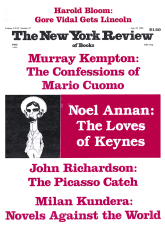In response to:
Excelsior! from the May 10, 1984 issue
To the Editors:
The single “revealing entry” in the bibliography to Daniel J. Boorstin’s Discoverers to which your reviewer devotes a full snide paragraph [NYR, May 10] is perhaps more revealing of the reviewer than of the author reviewed. He suggests that the author included such an irrelevant title only by the vulgar procedure of “leafing through a library’s catalog.” Far from it! Under “Part II: From Sun Time to Clock Time” Boorstin lists Arnold Palmer, Movable Feasts (1952), which happens to be a charming book (documented from late 18th and 19th century novelists) showing how the clock and other timekeeping devices and institutions defined or changed English times for eating meals, times for working, playing and theater-going. Your obtuse reviewer is not interested, and misses the point. But it is precisely such suggestive enticements that make The Discoverers an eye-opener, and that made it such a joy for me as editor to work with the author on this marvelous book.
Ruth F. Boorstin
Washington, DC
Keith Thomas replies:
I am afraid that Arnold Palmer’s Moveable Feasts has nothing whatsoever to say about the influence upon English mealtimes of clocks and other timekeeping devices. The only reference to clocks occurs in a footnote (p. 36), where Arnold Palmer remarks that public clocks had existed in London for over a century before the period with which he is concerned and that the topic “lies outside our subject.” At the risk of appearing obtusely resistant to Dr. and Mrs. Boorstin’s “suggestive enticements,” I continue to think that only some unfortunate accident can account for the presence of Moveable Feasts in the part of the bibliography devoted to “calendars and calendrics.”
This Issue
July 19, 1984



